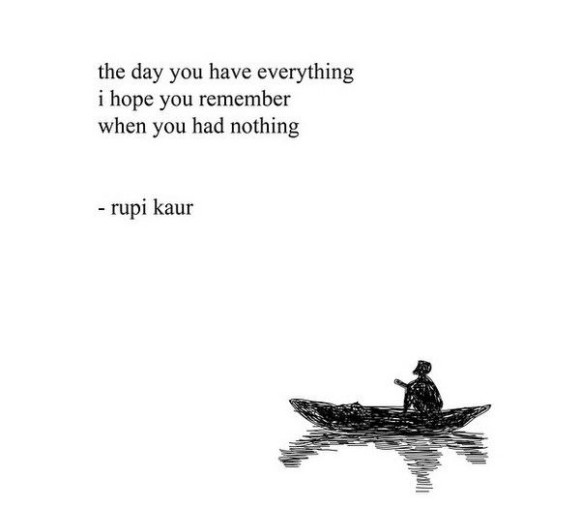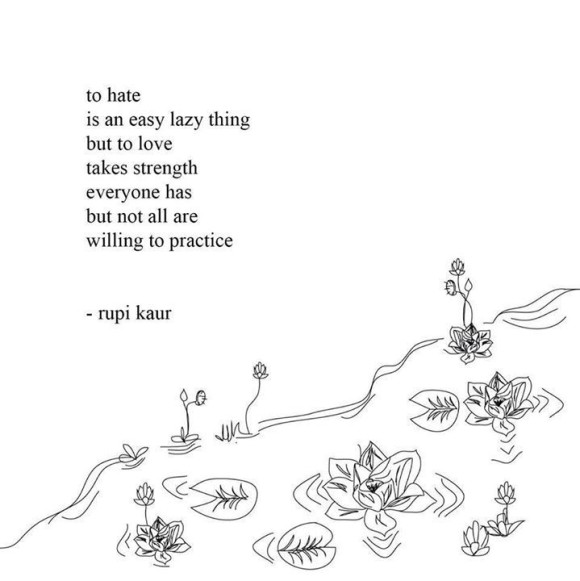Throughout the semester, I’ve been more or less working my way towards the present. Obviously my analyses have been in no way a comprehensive guide to English poetry, but I’ve tried to cover major periods and major poets in some way. So, here we are, in the present, and I’ve decided to choose to look at some of rupi kaur’s poetry from her first collection, milk and honey. Though I’ve read some of her work here and there, I only recently read a lot of it at once, and realized that she was a young woman author and I am now obsessed. I just ordered milk and honey on Amazon and you should too.
Before we jump into her poems, I want to just call attention to the fact that she doesn’t capitalize her name, much like e. e. cummings and bell hooks. This shifts the focus from the author to the work and minimizes the importance of the self, which I really love. Another interesting thing about her is that milk and honey is a visual as well as textual work, and most of her writings are accompanied by drawings, which help to orient the poem and are also really beautiful.
I love this. Many of her poems are pretty straightforward, this being one of them. The message is clear: love. But love is not something easily practiced, rather it takes work. It’s hard to love. Because, as her book goes over, with love there is pain. Yet, she still believes that love is better than hate, that to hate is too easy, and love is a universal ability.
 It’s a simple poem, just three lines, but it carries a tremendous weight. In this poem, rupi kaur calls the reader directly to look at their lives, and to remain humble. Life is fleeting and ephemeral, and the drawing of the figure on the lake aligns the poem with the water, and the floating of life above it. In this way, she uses the illustration to further the idea of the poem beyond words, and the two mediums work together to tell the reader just how insignificant their eventual successes will be, and imploring them to remember that they are no more when they have everything than when they have nothing. Love it.
It’s a simple poem, just three lines, but it carries a tremendous weight. In this poem, rupi kaur calls the reader directly to look at their lives, and to remain humble. Life is fleeting and ephemeral, and the drawing of the figure on the lake aligns the poem with the water, and the floating of life above it. In this way, she uses the illustration to further the idea of the poem beyond words, and the two mediums work together to tell the reader just how insignificant their eventual successes will be, and imploring them to remember that they are no more when they have everything than when they have nothing. Love it.
 This I think is one of my favorites. It’s amazing. The way that she constructs the male gaze as it constructs her and all women is especially interesting. She here takes aim at an idea that feminism has been turning against, the “I’m not like other girls” phenomenon, in which girls seek to raise the opinion that others – primarily men – have of them by putting down the rest of womenkind, in such a way that valorizes masculinity while condemning femininity. rupi says no, she won’t be a part of that, and the very fact that that is what men want, to denigrate women by subtle microaggressions and internalized misogyny, is so inherently vile a concept to her that she wants to spit the man’s tongue out, she wants to expel that belief from her and remove his ability to speak on behalf of men through women. I just really really love this one.
This I think is one of my favorites. It’s amazing. The way that she constructs the male gaze as it constructs her and all women is especially interesting. She here takes aim at an idea that feminism has been turning against, the “I’m not like other girls” phenomenon, in which girls seek to raise the opinion that others – primarily men – have of them by putting down the rest of womenkind, in such a way that valorizes masculinity while condemning femininity. rupi says no, she won’t be a part of that, and the very fact that that is what men want, to denigrate women by subtle microaggressions and internalized misogyny, is so inherently vile a concept to her that she wants to spit the man’s tongue out, she wants to expel that belief from her and remove his ability to speak on behalf of men through women. I just really really love this one.  I also really love this one. Unlike many of her poems, this one has a title, to fathers with daughters, so that the reader is able to orient the audience. It is written to fathers with daughters, and that is who the “you” is addressing. She tells them that yelling at their daughters and saying that it’s love is in fact detrimental to their children, as girls will learn that anger and love look the same, and will inevitably fall into that trap. It’s another powerful remark on how men construct the identities of women, in this case because the men in question are the fathers of the girls they are shaping. It calls upon the utmost fear of the parent- that they will inadvertently lead their child to be hurt, but rupi does not allow the fathers to get out of it by saying they meant well. Instead, she says, this is unacceptable. Do better. Do not raise your daughters to believe that a man’s love looks the same as his anger.
I also really love this one. Unlike many of her poems, this one has a title, to fathers with daughters, so that the reader is able to orient the audience. It is written to fathers with daughters, and that is who the “you” is addressing. She tells them that yelling at their daughters and saying that it’s love is in fact detrimental to their children, as girls will learn that anger and love look the same, and will inevitably fall into that trap. It’s another powerful remark on how men construct the identities of women, in this case because the men in question are the fathers of the girls they are shaping. It calls upon the utmost fear of the parent- that they will inadvertently lead their child to be hurt, but rupi does not allow the fathers to get out of it by saying they meant well. Instead, she says, this is unacceptable. Do better. Do not raise your daughters to believe that a man’s love looks the same as his anger.
I just ordered milk and honey on Amazon and am anxiously awaiting its arrival.

I LOVE rupi kaur. One of my favorite writers of poetry. She has such an understated yet powerful style that I just really feel like I can relate to. She’s kind of the Bruce Springsteen of poetry. The poems you selected here are gorgeous and I, as always, love your take on them. I didn’t know why she didn’t capitalize her name and am very glad to learn this. I LOVED YOUR BLOG THANKS
To hate / is an easy lazy thing / but to love / takes strength / everyone has / but not all are / willing to practice. This one is a direct hit to me for I have been hanging around with the motto “do not hate” for a while now. I have read, in multiple instances, about subtle actions and lines that sometimes even to the surprise of the authors give out the fine scent just like the love brought by a certain religion–even though the author had no belief in one or did not intend to invite religious context into the text. To love and not hate is something lying deep, yet something really shapes a person. Also the phrase “milk and honey” reminds me of some of by best times ever! Besides, not capitalizing her name… This is indeed thought provoking, especially when one is looking into the relationship between the author and one’s composition.